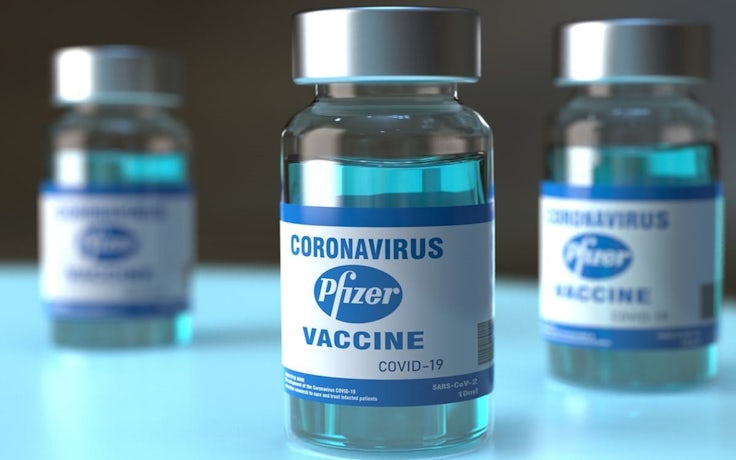Is Pfizer’s ‘Comirnaty’ genius branding or a major misstep?
Pfizer’s newly named Covid vaccine has been met with ridicule and scorn, but while some believe it makes “little logical sense” others think it could be part of a bigger play by the pharmaceutical giant.

Such was the speed at which Covid-19 vaccines were developed last year that all were put out into the market without registered names. Thus, the world has distinguished them by the parent company which produced them: the Pfizer vaccine, the Moderna vaccine, the AstraZeneca vaccine.
But after 18 months of lockdowns and restrictions, Pfizer’s vaccine has finally been given full approval by the US’s Food and Drug Administration (FDA) for people aged 16 and over. As part of the approval process, the vaccine’s official brand name is now approved for use in the US.
But the name has attracted an unusual amount of public attention, criticism and ridicule for a pharmaceutical brand name. Cominarty, pronounced ‘koe-mir-na-tee’, has been mocked across the US media, including on popular talk shows hosted by Seph Meyers and Jimmy Fallon, for its unnatural pronunciation and lack of memorability.
According to Pfizer, the name was devised by merging together the words Covid-19, community, RNA and immunity. In comparison, Moderna has gone with the simpler name Spikevax.
Speaking to Marketing Week, brand consultant Andrew Marsden says the name Cominarty makes “little logical sense” from a consumer perspective.
“No one with any real knowledge of linguistics would come up with such a convoluted pronunciation,” he says. “Certainly you would want a recognisable name and it seems what they’re doing is mixing science up with consumer language.”
“It would help if the name was pronounceable,” he adds. “Pfizer is difficult enough. You want to be able to have that brand recognition.”
And the winner of the Covid vaccine brand battle is…
Branding genius?
However, consultant and Marketing Week columnist Mark Ritson suspects a deeper strategy may be at play.
According to Ritson, in terms of brand architecture, the vaccine becoming known as the ‘Pfizer vaccine’ was an “ideal outcome”.
Writing on LinkedIn, he explained: “It ensured that the positive, advanced, superior, life saving, world changing implications of the vaccine flowed directly back to the Pfizer mothership and its corporate brand image.
“Contrast that with Viagra. Two decades ago that drug also had enormous societal impact but almost none of it was linked back to Pfizer because of its endorsed brand naming (Viagra from Pfizer).”
Ritson’s suspicion, therefore, is that Pfizer might have deliberately attempted to create a name “so stupid, so hard to pronounce and remember”, that the vaccine will continue to be commonly known as the ‘Pfizer vaccine’ while still ticking the necessary box of having a registered name.
Given the limitations in how you can market vaccines and what you can name them, I can see the benefits in really trying to ground it in the celebratory nature in which this was developed.
Helen Edwards
“Without wanting to sound like a New Coke conspiracy theorist, I would not put this past the Pfizer marketing team,” he said. “They might be idiots. But they could also be branding geniuses.”
However, fellow consultant and Marketing Week columnist Helen Edwards disagrees that Pfizer would want its parent brand to become synonymous with its Covid-19 vaccine.
“Pfizer is a bigger company than that. And so while it’s good that it has been associated with [the Covid-19 vaccination], it doesn’t want to be only associated with that,” Edwards says.
“They need breadth and scope to be known for other things across the whole pharma industry.”
Pfizer claims its purpose as a company is to “advance breakthroughs that change patients’ lives”, under the banner ‘Health for All’.
“So really, at the heart of what Pfizer wants to be known for is innovation in pharma, not for the Covid vaccine,” Edwards says.
She adds that she’d be surprised if the convoluted name chosen by Pfizer for the vaccine was done with the end consumer in mind, as Pfizer’s customer base consists of national governments and healthcare systems. A more likely explanation for ‘Comirnaty’, she suggests, is category convention.
“We expect drugs to be difficult to pronounce,” she says. “If it were just called ‘Pfizer Orange’, it wouldn’t have the same credibility.”
Storytelling
There are also strict limitations in the pharmaceuticals industry around naming medicines that make creating a catchy name somewhat difficult.
To get marketing authorisation in the European Union and US, a name can’t make claims about what it does and has to be uncommon so it can be easily trademarked and copyrighted, explains Kirsten Dimmock, planning director at pharmaceuticals specialist agency VCCP Health.
However, it doesn’t make much sense for a brand name to be forgettable, she adds. In a lot of markets around the world, healthcare professionals prescribe drugs by brand. Pharmaceutical companies also lose their patent on drugs after a certain amount of time and therefore lose exclusivity, so there’s “big value” in developing brand and name recognition so it continues to be prescribed.
“It’s not actually in [Pfizer’s] best interest to not be memorable,” she says.
On the name Comirnaty, Dimmock adds that she’s “not completely sure” that it needed the rationale behind it, with the blending of different words. However, she sees the benefit of leaning into the idea of community because of the unusual way in which these vaccines were developed through a worldwide community effort.
“You had countries that are not natural political bedfellows sharing information openly and transparently, all for the greater good,” she says. “It’s a pretty remarkable story about what humans can achieve on a mass scale when you work together for the better.”
Storytelling can be a “very effective” way of driving preference among healthcare professionals and governing bodies, she adds.
“Given the limitations in how you can market vaccines and what you can name them, I can see the benefits in really trying to ground it in the celebratory nature in which this was developed and what it’s meant for communities around the world.”
Think about Viagra, she adds. “That is a very odd name. Every name is odd until it’s not.”
Value in Pfizer recognition
However, that’s not to say there isn’t value for Pfizer in becoming a recognisable name. While, as a house of brands like P&G and Unilever, pharmaceutical companies like Pfizer haven’t had much need in the past to leverage the parent brand outside specific audiences, people are now becoming “much more aware” in all areas of their personal health, Dimmock says.
“They want to know that companies are behaving ethically, that they are giving back to the communities, that they are not being detrimental to the environment,” she says.
“And these are now things that are becoming considerations at a national laboratory level. When healthcare systems like the NHS go looking into which drugs and which companies they partner with, they’re now taking more considerations into account than they ever have before.
“It used to be about whether it works and what’s the price, but now you have a lot more consideration. So there’s a lot more value in helping to create positive brand recognition, and I think it can only be good for Pfizer.”
Meanwhile, Andrew Marsden says there is no marketplace more reliant on trust than the medical industry, and brands are fundamentally a statement of trust.
“It is absolutely critical that Pfizer is a trusted brand which sells things that you put into your body that work,” he says. “So of course it’s an advantage for the consumer to know Pfizer because they will feel at ease when medics prescribe Pfizer and they’re given Pfizer products. It’s a good platform.
“From a serious marketing perspective and proper branding perspective it is critical Pfizer doesn’t do anything to diminish its public trust.”



 Print the article
Print the article